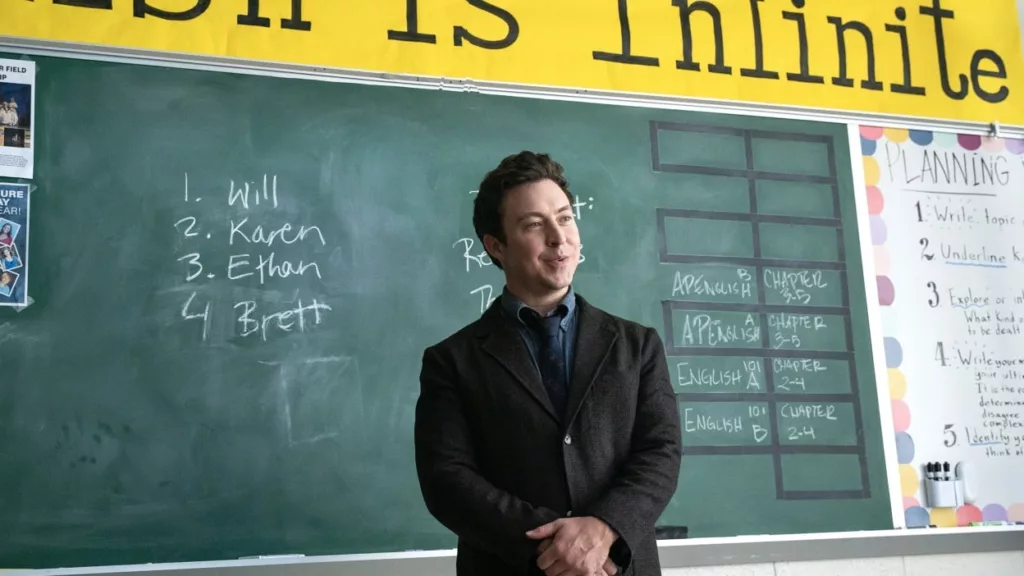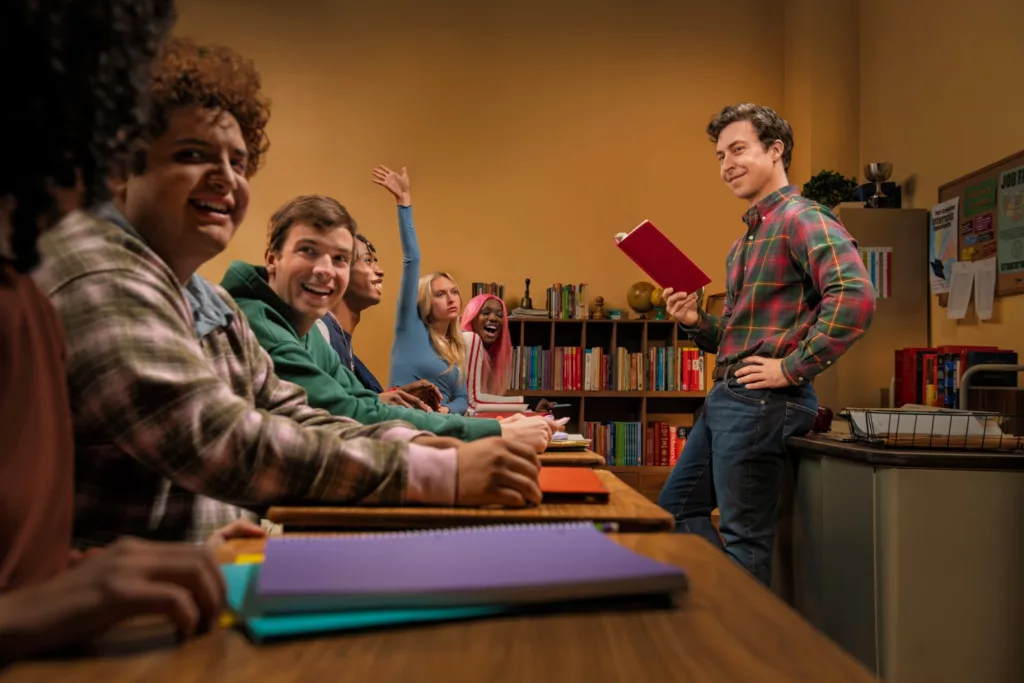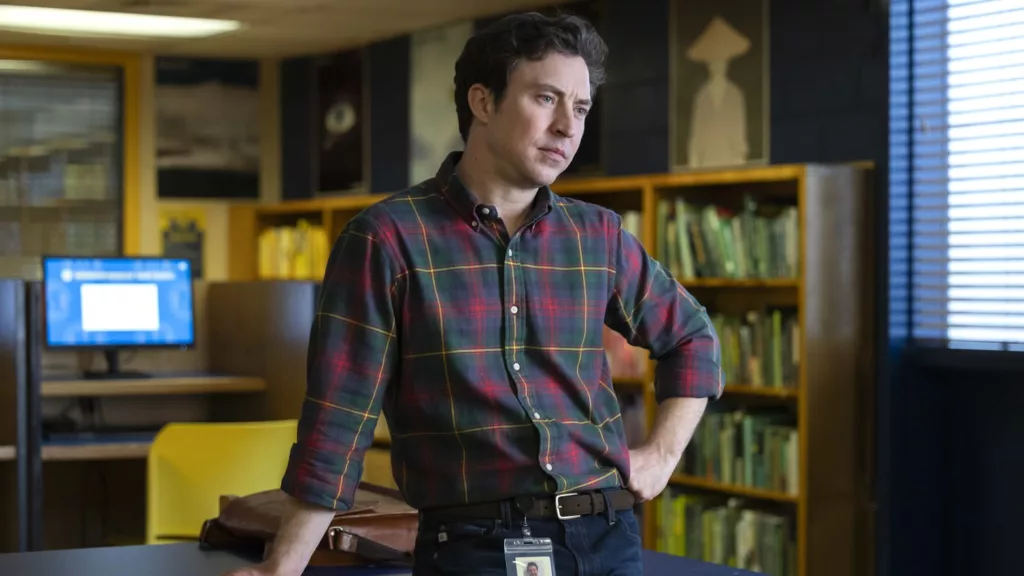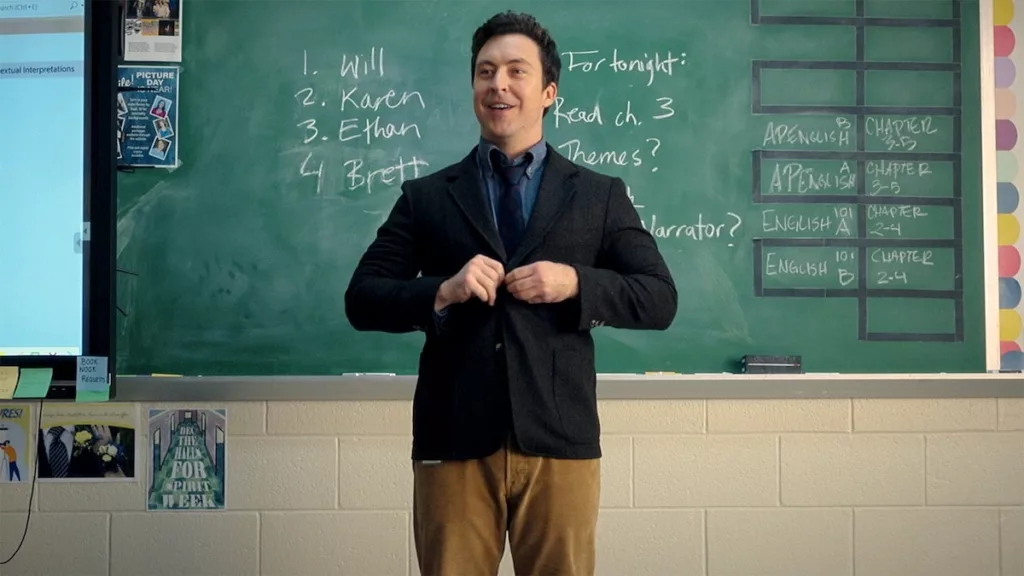A new FX sitcom brings levity and insight to portrayals of modern education through economical yet diligent craft. English Teacher, created and starring Brian Jordan Alvarez, wastes not a moment nor word in its introduction, establishing a foundation for resonance.
Set in a Texas public high school, it presents protagonist Evan Marquez, an idealistic English instructor navigating career passions amid personal and societal trials. Deft character introductions outline fellow teachers and administratives, as well as the student body, with impressionistic vignettes providing dimensionality exceeding brief runtime.
Artfully compressed yet richly detailed, this introductory sequence establishes the series’ mastery of harmonizing topical commentary with soulful portraiture within constraints. It hints at a narrative-balancing weighty exploration of educators’ domains with affirmatory yet realistic humor through vividly drawn personalities.
Moreover, it establishes a tonal balance elevating issues like LGBTQ rights, gun policy, and academic freedom beyond headlines through people navigating everyday realities. Genial yet discerning, it presents a thoughtful venture from Brian Jordan Alvarez, marrying inclusiveness and keen social insight through a limitless heart.
With such auspicious exposition, English Teacher excels rapidly at cultivating rewarding television through storytelling, prioritizing substance and craft over flash or easy laughter. It introduces a promissory venture deserving streaming’s highest recommendation.
Socially Astute Satire
“English Teacher” distinguishes itself through nuanced social commentary threaded skillfully within humor. It approaches weighty topics of the educator’s domain, from acceptance to firearm policy, without didacticism. Instead, issues emerge organically from characters’ diverse perspectives; their stances often upend assumptions.
Protagonist Evan champions inclusiveness but overlooks viewpoints beyond his own. His steadfast principles paradoxically blind him at times, revealing how rigidity imperils even the open-minded. Fellow instructors similarly subvert expectations: Gwen balances carefree wit with hidden depths, while Markie pulls back stereotypical brashness to uncover rationality neglected by “intellectuals.”
Intriguingly, students avoid reduction to archetypes. Their maturity fluctuates between cynicism and innocence natural of youth, attitudes shifting less from fickle ideology than life’s contradictions. One proclaims a newly diagnosed malady yet harbors insecurity above activism. Their complex, conflicting natures stem less from caricature than from perceptive, truthful characterization.
Even romantic angles introduce nuance over facile storylines. Evan torn between duty and passion mirrors society navigating progress amid tradition. His connections feel authentic, compelled by heart rather than script.
Through vivid characterizations far surpassing placeholder, “English Teacher” elevates discussion of pressing issues. It recognizes no single perspective as beyond reproach yet maintains empathy for mankind’s imperfections. Above all, it displays how humor rooted in social insight and human truth cultivates understanding preferable to overt dictates, whether comedic or ideological.
Cultural Calibrations
“English Teacher” navigates complex societal debates surrounding education with a deftness that elevates thought-provoking themes above fleeting headlines. It frames pressing issues through an ensemble depicting how viewpoints evolve from individual lived experiences more than ideological allegiance.
Issues of gender, firearms, and academic freedom emerge not as objects of polemic but as lived realities filtered through the absurd lens of fallible protagonists. Evan champions inclusion yet risks obliviousness; Markie asserts conservatism yet harbors unconventional wisdom. By embedding relatable characters within issues, the show engenders perspective-taking over partisan posture.
Admirably, “English Teacher” satirizes idealism without denigrating its spirit. Evan faces humbling realities with a perseverance reflecting teaching’s challenges rather than false triumphalism. His passion remains admirable despite imperfections paralleling society’s ongoing calibrations.
Subtly, the comedy skewers preconceptions on all sides. Students abandon “wokeness” not due to fickle ideology but growth’s complications, proving attitudes develop less from labels than life’s internal logics.
Through fast-paced farce and grounded characters, “English Teacher” sparks insightful cultural dialogue. It illuminates society’s fluid complexity better than simplistic screeds, instead portraying issues as constantly negotiated like the living, learning beings that define them.
Masterful Moments
Within its brief runtime, “English Teacher” packs nuanced narrative beats that elevate standalone episodes into memorable slices of living comedy. The pilot introduces its players with virtuosic economy, outlining backstories and dialects in scarce minutes.
Particularly notable is the standout second installment. Tackling complex issues of gender and tradition, it subverts presumptions through a student-driven protest and riotously amusing drag performance coordinated by Evan. Executive abilities surface as protean problems subtly evolve into a community-building spectacle.
Weightier still, the fourth episode sees ideological opposites. Evan and Markie clash over firearm policy, only to discover bridging divides demands listening beyond preconceptions. Respect permeates tense scenes, avoiding simplistic catharsis for multifaceted understanding.
Small yet poignant plots also resonate, such as a teacher ranking submitted unleashing insecurity. Minor arcs portray life’s prose, complementing the poetry of headlines. Moreover, student-driven vignettes convey hormonal realities transcending glib generalizations about youth.
Regrettably, missed opportunities arise from truncated arcs, like Evan’s romantic involvement fading abruptly after hinting at future nuance. Additional installments might flesh out dangling threads.
Nevertheless, in constraint, “English Teacher” finds mastery, crafting standalone triumphs alongside a greater story through economical yet meaningful moments, leaving impressions beyond their brevity.
Performances with Purpose
The success of “English Teacher” arises profoundly from its players, whose collaborated dynamic pulses with a lived-in authenticity. At the forefront, Brian Jordan Alvarez brings soulful nuance to Evan, balancing earnestness with fallibility in a manner resonating with complex truth.
Alongside, an ensemble acts in perfect concert, transitioning whip-smart repartee with the fluid grace borne of intimacy. Their bonds feel forged beyond artifice through works’ diligent observation of human quirks. Stephanie Koenig and Sean Patton especially shine, imbuing support with dimension surpassing caricature.
Artfully, absurdity arises not as an end but means absurdism uplifting poignancy over merely eliciting mirth. Grounded humor stems from character rather than isolated witticisms. Subtlest gestures, too, ring profoundly sincere – a principal’s pained imitation of medicine, small yet speaking volumes.
Comedic timing marries manic speed and rhythmic pacing. Heightened reality stimulates through mirroring life’s contradictions, from caustic students espousing maturity to ostensible clods professing wisdom.
Ultimately, “English Teacher” triumphs through performances calibrated to serve storytelling, pioneering social insight. Its players enact not simply script but fully formed souls, cultivating compassionate comedy through authenticity of craft and caring for humankind.
Equating Excellence
Inevitably, “English Teacher” arises as a counterpart to the acclaimed “Abbott Elementary” in reprising the public educator’s domain for comedic exploration. Both invaluable shows commemorate teachers’ nobility of spirit alongside society’s failings.
Structurally, distinctions emerge as pronounced as commonalities. Where “Abbott Elementary” charmingly mimics docudrama, “English Teacher” races at breakneck improvisatory speed. Yet shared is the delicacy honoring profession over punchlines, prioritizing character authenticity.
Content-wise, the cable format permits “English Teacher” gravitas exceeding network limitations. It tackles gun control, LGBTQ rights, and sociopolitical discord with depth surpassing fleeting headlines. Simultaneously, humor remains grounded rather than didactic, understanding while poking fun at all sides.
Performances also diverge creatively—Janelle James’ overprepared Abbott inhabits different energies than Brian Jordan Alvarez’ soulful Evan. Yet mutuality exists in cultivating fully-fleshed players amidst farce scenes.
Fundamentally, both elevate educators’ significance during tumultuous times. But where constraints may contain “Abbott Elementary,” “English Teacher” hints potential for nuanced evolution across seasons, fleshing narratives and embedding societal insight deeper within lives intimately portrayed.
Ultimately, comparison underscores television’s triumph for social commentary—that two programs so wonderfully celebrate teaching amidst controversy. Both earn keeping class in session for years to come.
Reinforcing Distinction
With its debut season, “English Teacher” has emerged a bright neon beacon amidst the sitcom landscape—one of the freshest, most assured comical triumphs in recent television.
Its early exhibitions of narrative intelligence and character depth through meticulously structured fiction bode promisingly for enrichment across time. Already, the show navigates cultural schisms and generational divides with prudent acumen rarely accomplished so nimbly.
Come for whip-smart repartee and absurdity amidst poignancy. Stay for how its perceptive scrutiny of societal fault lines cultivates understanding superior to partisan rhetoric. Underneath hijinks surface timely observations, but the heartbeat remains its vibrantly portrayed players and the intrinsic truths that animate them.
In Brian Jordan Alvarez and collaborators, “English Teacher” displays a vision poised to resonate for years as its subjects evolve. Through living, learning protagonists and their community, it offers respite from polarization while motivating us to continual betterment.
For discerning viewers, “English Teacher” deserves streaming’s highest recommendation—a comedy enhancing life’s lessons as much as eliciting laughter. Its class remains powerfully in session.
The Review
English Teacher
While still a work in progress, English Teacher shows great promise in its inaugural season. With a talented cast bringing nuanced life to an ensemble of richly drawn characters, the series generates belly laughs while maintaining an insightful examination of important issues. Under Alvarez's guidance, the writing displays a deft hand at subverting expectations through wit, heart, and an authentic rendering of the high school experience. With time to further develop its storylines and characters, English Teacher proves itself an early gem worthy of cultivating. For its superb comedic timing, socially aware perspective, and abundant potential, I give the inaugural season of English Teacher an 8 out of 10.
PROS
- Excellent comedic timing and rapport between ensemble cast
- Nuanced exploration of relevant social issues in thoughtful way
- Evokes authenticity of the high school world and generational differences
- Showcases Alvarez's skill at subverting expectations humorously.
- Establishes compelling core characters with room for growth.
CONS
- Potential overreliance on topical humorous targets
- Evan was not fully developed as the central protagonist initially.
- Short season length limited character/plot development






















































Discussion about this post